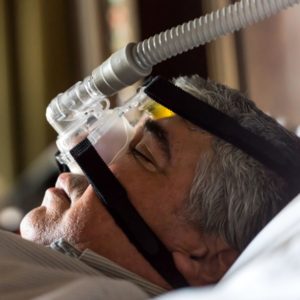
Sleep apnea is a complete blockage of the airway as the tongue and other soft tissue in the back of the throat sag backward to the degree that they block the airflow. When the brain senses its access to air has been stopped it awakens the person. This restores airflow. With sleep apnea, this sequence can happen dozens of times every night, and the person may not have any idea they are awakening all of these times. All they know is the next day they are tired, sleepy, have trouble concentrating, and the other signs of obstructive sleep apnea.
We’ve talked about the various treatments, including CPAP masks, which create an air pressure difference between the mask and the outer air. This works to keep the person’s airway open. The problem with CPAP is that system is cumbersome (you’re attached by tubing to the machine) and can be quite hard to sleep with.
That’s why Dr. Volpi likes to treat sleep apnea with oral appliance therapy, if possible. In this springy blog, let’s get into this option for sleep apnea.
What are oral appliances?
There are dozens of FDA approved oral appliances available for sleep apnea. Each is custom made and worn in the mouth during sleep to prevent the collapse of the tongue and soft tissues in the back of the throat during sleep.
The two most common types of these appliances are:
- Tongue-retaining appliances — These reposition the tongue during sleep to prevent airway blockage.
- Mandibular advancement devices — These reposition the lower jaw and tongue, preventing airway collapse.
How do oral appliances work to stop sleep apnea?
These devices are custom made for the patient for a precise fit. They are similar to wearing a sports mouth guard or a retainer. The patient wears them only during sleep, and the devices improve snoring and sleep apnea by positioning the tongue and jaw to keep the airway open during sleep.
What are some benefits of oral appliance therapy?
- These are non-surgical treatments
- Easy to wear and get accustomed to
- Short adjustment period
- Small and easy to carry when traveling
- No tubes and machine to worry about (CPAP)
- Compliance rates are much higher than with CPAP
- Provide significant improvements in oxygen saturation at night
- Decrease snoring dramatically
If the patient’s sagging tissues are not too severe, oral appliances offer a great treatment for sleep apnea.
If you think you may be suffering from sleep apnea, please call us at eos Sleep and have Dr. Volpi check you out. Call us at (212) 873-6036 to make your appointment.
